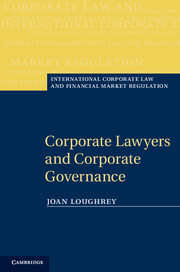Book contents
- Frontmatter
- Contents
- Preface
- Table of cases
- Table of statutes
- Table of statutory instruments
- International treaties
- List of abbreviations
- 1 Introduction
- 2 The international perspective
- 3 The roles of the corporate lawyer
- 4 Identifying the corporate client
- 5 The role of the corporate lawyer in intra-corporate litigation
- 6 The corporate lawyer as director
- 7 The regulation of the corporate lawyer
- 8 The case against reform
- 9 Reforming the role of the corporate lawyer
- 10 The reform of the legal profession and the role of the corporate lawyers
- 11 Conclusion
- Bibliography
- Index
- References
6 - The corporate lawyer as director
Published online by Cambridge University Press: 07 October 2011
- Frontmatter
- Contents
- Preface
- Table of cases
- Table of statutes
- Table of statutory instruments
- International treaties
- List of abbreviations
- 1 Introduction
- 2 The international perspective
- 3 The roles of the corporate lawyer
- 4 Identifying the corporate client
- 5 The role of the corporate lawyer in intra-corporate litigation
- 6 The corporate lawyer as director
- 7 The regulation of the corporate lawyer
- 8 The case against reform
- 9 Reforming the role of the corporate lawyer
- 10 The reform of the legal profession and the role of the corporate lawyers
- 11 Conclusion
- Bibliography
- Index
- References
Summary
Introduction
This chapter considers whether in-house and external corporate lawyers should sit on company boards, focusing on the regulation of solicitors. As with many other issues pertaining to corporate lawyers, this question has largely been overlooked in the United Kingdom but extensively discussed in the United States, where, in 1998, the ABA issued a Formal Opinion declining to prohibit the practice. Part of the reason for the neglect of this topic is that it may not be as common in the United Kingdom as in the United States for lawyers to join the boards of client companies. It is not clear how extensive the practice is in the United Kingdom, but it may have been more widespread in the past than it is now. Nevertheless, it is far from being unknown. Furthermore, the number of solicitor-directors may increase in the wake of the Legal Services Act 2007, which permits outside ownership of law firms. If lawyers are seen to be running businesses which are structurally very similar to other commercial companies, this could encourage the perception that they possess the skills required of directors, rather than purely the skills of advisors. As result, clients may be more inclined to invite them on to boards.
The SRA Code says little about lawyers sitting on clients' boards, although it is clearly permitted.
- Type
- Chapter
- Information
- Corporate Lawyers and Corporate Governance , pp. 158 - 178Publisher: Cambridge University PressPrint publication year: 2011



